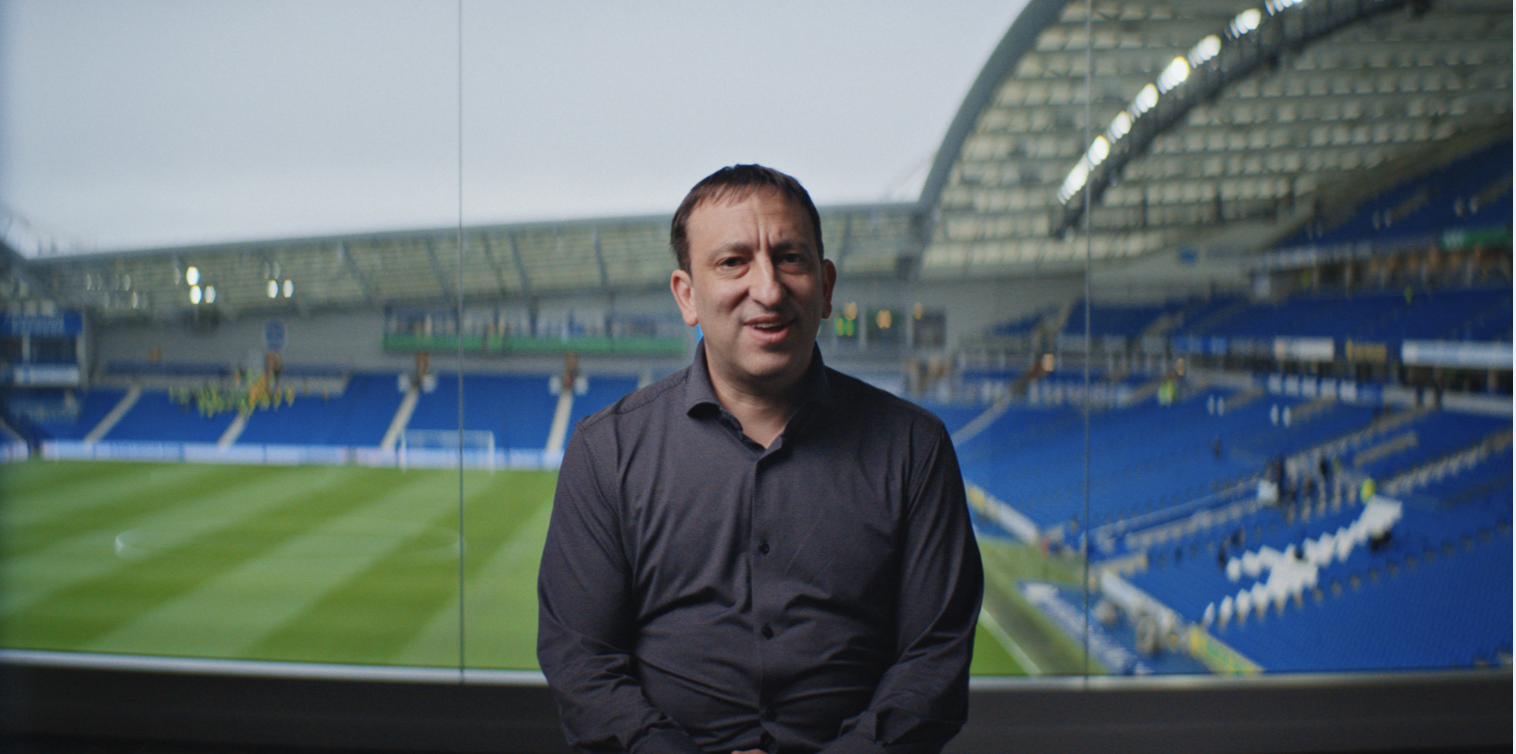Stand or Fall
Dogma contributor and award-winning football film director Louis Myles sat down for a producer-on-producer chat with Stand or Fall’s Matt Lorenzo to discuss the most anticipated movie of 2024
“I’m a West Ham fan. We’ve had a hell of a ride over the past 25 years or so. But would it make a good film, and would I want to make it? No.”.
Matt Lorenzo’s opening gambit is both surprising and also pretty much interview defining. Every football fan thinks that their club’s story is the best, that there is just so much to tell. In reality, there is usually a series of events that are covered well enough in real time that there is little more to say. Also, given the fickle nature of football, there are few continuing characters to hold a feature length film.
To admit that your own clan’s story probably isn’t worth telling, especially when you could make a few quid off telling it, is quite something.
“The Brighton story is remarkable. It just is. It’s one of the very few club stories that is worthy of a film.” I had been looking forward to speaking to Matt. We’re both filmmakers and have made similar films down the years. It’s a bloody freezing day, and rather than meet for a coffee or a pint in a pub which is the norm with these things, both Matt and I are sat inside our respective offices, layered up in thermals speaking over the now-dreaded zoom.
Matthew Lorenzo Productions
Behind him are the trophies of his career. Actual ones, plus huge posters of his great screen portrayals of Bobby Moore, who was a family friend, and The United Way – a documentary on Sky.
Both are great films, but it is the last one in particular which sparked off the idea for Stand or Fall, the very long awaited documentary on the story of Brighton & Hove Albion which is finally getting its airing to the public in 2024.
“Paul Barber watched the film on Sky and texted me to say how much he enjoyed it. So I texted him back saying that the Brighton story is worth telling. Obviously, he agreed.”
From such conversations great things can occur, or they can come to nothing at all – such is the flimsy nature of making films.
The reality is that most projects end up in the bin, usually after significant unpaid work, before the ‘greenlight’ stage. The anxiety doesn’t end there as projects are often canned during production and can be ‘mothballed’ after completion.
It’s sort of a secret code that everyone in the industry has a nod and wink over, and it is why most filmmakers are always publicly glad that their colleague’s work actually gets out there.
"THE BRIGHTON STORY IS REMARKABLE. IT JUST IS. IT’S ONE OF THE VERY FEW CLUB STORIES THAT IS WORTHY OF A FILM."
“I initially thought it would take about eight months or so” says Lorenzo, smiling. “That’s the norm with these sorts of things”.
But it turned out that Lorenzo and his team were a bit of a problem for the club.
“The issue is always, where do you end these things? We started filming in January ’22 – hoping to catch an incredible arc. The team were doing well under P****r. But we rocked up and it all started to go ‘wrong’”.
The day that it hit that this thing might take a little longer was a bitterly cold Saturday game against a poor Burnley side. “You got smashed that day. Quite a few directors of the club were calling me a Jonah. Every time we turned up, the team just couldn’t win”.
Instead of getting nice shiny footage of smiley faces and happy players, it was all a bit muted. “It wasn’t that the story lived or died on the current fortunes of the club, but it does help to have a happy ending, especially with this story”.
Of course, as we all know, now is absolutely fabulous compared to then.
Matthew Lorenzo Productions
But in all reality, the ‘then’ that Matt is talking about was actually fabulous too, given where the club and us fans have come from and it’s something that comes across in the film.
“The story is really about the characters. The fans did so much to save the club, alongside the key people – Dick, Martin and of course Tony Bloom”
This film has all the hits; taking the viewer back to how the club’s current identity was basically formed post-83, solidified during the war years, the fight for Falmer, the Amex and right up to the modern day – which is part of the reason why it’s taken longer than the eight months Matt had originally planned for this.
“There was sort of a nice narrative ending point at the end of the 21-22 season. Brighton had their highest ever Premier League finish, you’d smashed Manchester United 4-0 at home. Everything was pretty rosy.”
"WITHOUT ALL OF THAT, THE CLUB WOULDN’T BE IN EXISTENCE. WHAT’S BEEN REALLY INTERESTING IS THAT TONY BLOOM HAS CHANGED THE IDENTITY AGAIN. AND KEEPS ON DOING SO"
But then, as Paul Barber says in the film “Todd Boehly called”. We’re still drinking from the fruits of what happened next, but for the film it meant a fair period of stasis.
“No one expected Brighton to become better after P****r – but De Zerbi has been utterly fantastic. We obviously had to work out how to weave it into the narrative for a while… and then the team sort of did it for us. It just meant we had to wait whilst the season played out.”
These films are not easy to make. So many people are attached to a club's history that it is impossible to get everybody in, let alone all of the stories. There is a great responsibility in doing so, because ultimately you are telling the story of people’s lives – and despite there being loads of great events, there has to be a narrative arc for it all to work.
“I had great hopes of not doing it chronologically – but it was kind of impossible not to do it that way”. I get what Matt is on about.
It’s important for a film to stand out from the crowd, to get noticed outside of a fanbase. I tried and failed myself, with films on Liverpool and Croatia.
“It’s just been a hell of a journey. And there is such a natural arc. You were in the fourth division… you nearly went out of existence… and now you’re one of the most interesting clubs in world football”.
Identity is a key theme in this film. Norman Cook’s opening gambit of Brighton being a cultural hot pot, full of free thinkers and left wingers sort of sets the idea that we’re a bit different down here, and there is that classic Sussex attitude of ‘we won’t be druv’ about Archer and Belotti, as well as the fight for Falmer.
“Without all of that, the club wouldn’t be in existence. What’s been really interesting is that Tony Bloom has changed the identity again. And keeps on doing so. Brighton had to be in the Championship for the Amex opening. Then a Premier League team. But then they had to be a top ten Premier League team… and who knows what the future holds, because it certainly doesn’t seem like slowing down”.
Matthew Lorenzo Productions
You don’t get to where we are now without a lot of work from many people, and it is nice to see contributions from Steve Gritt and Stuart Storer – but also many faces from the recent past, including Gus Poyet who is as charming and enigmatic as ever. Despite many of these characters never really crossing over – it sort of feels that the whole thing is connected somehow, that everything was always meant to build into what we are experiencing now.
Success helps of course. Everything seems rosy because we are having the times of our lives right now, but watching the film I am reminded of the tricky job that the club has on their hands.
They have to be a top level football team and operate commercially in that world, whilst also remaining a club that has this sense of fan ownership (even though it is owned by Tony Bloom) because of everything that was done to save the club. natural bedfellows, yet somehow the club has embraced both and this film leans into that.
Matthew Lorenzo Productions
Fans are given as much airtime as the players - and Tony Bloom comes across as an enthusiastic fan as much as he is the owner.
Given that the film was instigated by the club I am keen to know if anything was particularly off bounds?
“Tony’s secret sauce” Matt is laughing now “I mean come on, it’s absolutely ridiculous how you keep on getting these amazing players that nobody has ever heard of. Mitoma? Where did he come from? And now everyone knows that you’re a place to come to if you are a young player”
In a way, this leans into identity again. Brighton are the club that will help you get a shot at the big time. But Brighton is also the club that was saved by the fans and rose from the ashes all the way to Europe.
I think back to Matt’s opening statement about his own beloved West Ham. Over the 40 or so years that this film concentrates on, they’ve had a lot of ups and downs – and have even picked up a European trophy along the way. But if you think about it, their downs were a couple of seasons in the Championship, they are usually around the top ten in the Premier League and they have never really been under threat of losing the club completely.
Compare this to homelessness, ground-shares, playing in all four leagues of professional football, countless promotions and now Europa League football. Our story is unique, and one that is worthy of a film.
This article was originally published in Dogma Issue 11, February 2024 and has been amended slightly for publication here.








